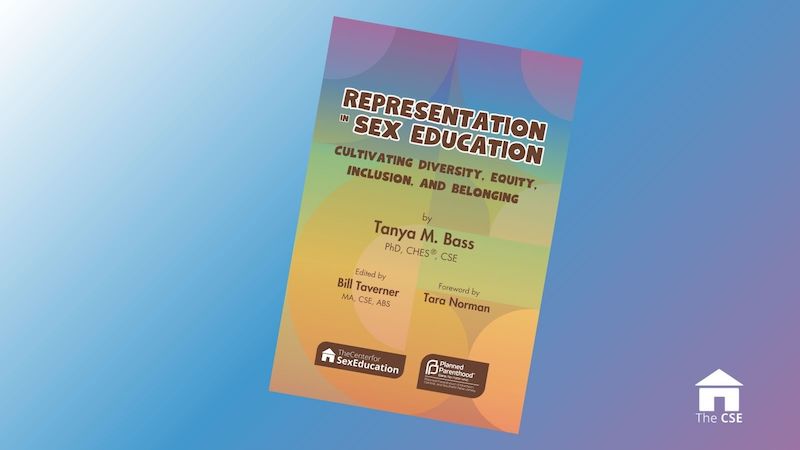
The Center for Sex Education is thrilled to announce the publication of Representation in Sex Education: Cultivating Diversity, Equity, Inclusion, and Belonging by Tanya M. Bass, PhD, CHES®, CSE and edited by Bill Taverner, MA, CSE, ABS.
Every student and community deserves to thrive. This can only be achieved when everyone can learn in a welcoming, safe environment with materials and perspectives that reflect their identities. Yet for decades, sex education curricula have often lacked a lens that represents the experiences of people of diverse backgrounds. Many outdated sex education lesson plans rely on the “he/she” binary or otherwise exclude nonbinary and transgender students. Contraceptive and safer sex lessons do not factor in America’s racist history in sexual and reproductive health care which may make students of color ambivalent or untrusting. Lesson plans and teaching manuals have few authors, contributing authors, or editors who identify as people of color, meaning that the lens of lived experience is absent from these works. Lessons with kinesthetic activities often lack guidance for students who cannot stand up or “walk to the center of the circle,” and little consideration is given to ensuring that students who are blind, deaf, or have other disabilities feel included.These are just a few examples; many students with other diverse identities have been marginalized in sex education.
However, while we acknowledge historical patterns within sex education, change through expanded representation is possible. Representation in Sex Education: Cultivating Diversity, Equity, Inclusion, and Belonging seeks to address these existing gaps in sex education curricula and materials.
Fueled by the urgent need for truly inclusive sex education, Dr. Tanya Bass and Bill Taverner used their wealth of experience within sex education and commitment to diversity, equity, inclusion, and belonging (DEIB) to develop Representation in Sex Education. This resource compiles feedback and DEIB recommendations from more than 100 sex educators nationwide, raising awareness among educators about the crucial need to represent the experiences of diverse backgrounds in sex education.
As Tara Norman beautifully stated in the book’s foreword, “Empathy is a necessary component of progress, as it fuels the motivation to effect change within individuals, their communities, and broader societal systems. Without empathy, people are often unlikely to act on behalf of others.” We aspire for this guidebook to serve as a valuable resource to all professionals who deliver sex education. This guidebook offers practical tips to professionals on cultivating a learning environment that respects and values diversity while promoting equity and a true sense of belonging in sex education. We hope this resource will empower professionals to deliver sex education that is truly representative, inclusive, and supportive for all learners.
Representation in Sex Education is available now at the Center for Sex Education’s online shop, www.SexEdStore.org. The guidebook is available as a free e-book, and print copies are available for purchase.
The Center for Sex Education (CSE) is the national education division of Planned Parenthood of Northern, Central, and Southern New Jersey (PPNCSNJ). The CSE publishes more than 25 sex ed teaching manuals and hosts the National Sex Ed Conference, the nation’s largest conference for sexuality educators. PPNCSNJ’s “Care. No Matter What” values extend far beyond the health center: ensuring diversity, equity, inclusion, and belonging across every aspect of the organization is a key priority. This work includes building an environment where every employee can flourish, every patient can flourish, and every community can achieve its full health potential. PPNCSNJ strives to make equity-centered investments that empower employees, patients, and communities to be their whole selves. These efforts are an ongoing journey, and PPNCSNJ remains committed to challenging ourselves to do better.









